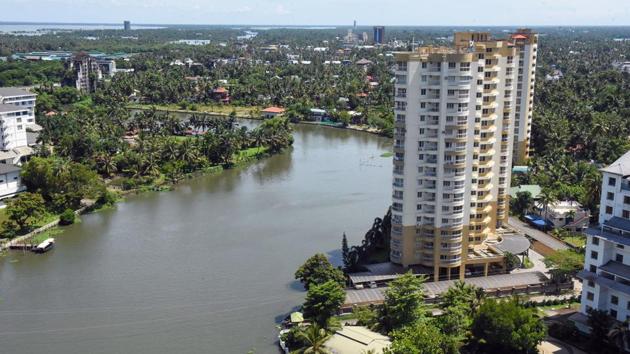Kochi flats to be demolished by controlled implosion, locals worried about environmental impact
Locals staying near flats are a worried lot, saying a proper environmental impact study was not done and they fear high-intensity implosions may affect nearby structures also.
Authorities have decided to carry out controlled implosion to demolish four waterfront apartment complexes in Kochi that house 357 flats. Experts say controlled implosion is an accepted demolition technique in which explosives are placed at strategic spots to raze the structure within its perimeters.

People staying within a 2 km radius of the flats at Maradu will be evicted as a precaution and experts said maximum care should be taken to spare the environment of further damage while demolishing these flats.
Those staying near flats are a worried lot, saying a proper environmental impact study was not done and they fear high-intensity implosions may affect nearby structures also.
“The average height of these buildings is 70 metres. Some of them have 19 floors and others 16. It is not easy to pull down such huge structures. We heard in India the tallest building imploded so far is 40 metres high. We are worried because big implosions are likely to affect nearby structures,” said P Devadasan, one of the residents staying near the flats in Maradu.
Locals say irrespective of modern techniques demolition of such structures will cause environmental degradation. Besides polluting wetland ecosystem, scientific disposal of debris should be addressed properly, they say. A person staying near the flats had moved the apex court last week saying demolition without proper planning and assessment will lead to “collateral damage” of the environment. The court, however, had refused to entertain his plea.
But environmental experts say some of these fears are ill-founded. “After 9/11 tragedy we have seen how US authorities pulled down the damaged structure. We have that expertise and it is unfair to raise ecological issues now. Illegal encroachment of land and water bodies should be contained. We have to put a full stop somewhere before it slips out of our hands. That is what the Supreme Court has done in the case,” said environmental scientist Dr CM Joy.
He said disposal of debris won’t be a big issue. “Many quarries have inflicted gaping holes in our hilly areas. Debris can be used to fill some of them. The solid debris can be used for other purposes also. If we analyze the judgment in its true spirit such fears won’t arise,” he said adding it is our duty to preserve environment for next generation.
In its last hearing on September 2, the SC had directed the state to demolish flats in 138 days. Kochi sub collector Snehil Kumar, who is overseeing demolition, said residents will be shifted by October 3 and demolition process will take 90 days and clearing of debris and other process will take 40 days. The government is planning to hand over buildings to the successful bidder for demolition on October 11. Left with no other choice, flat owners said they were co-operating with the state government and it will ensure their rehabilitation.






